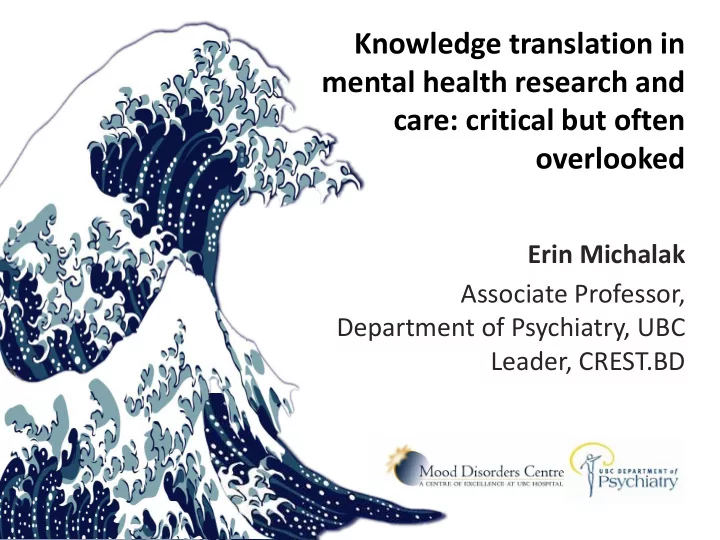

Knowledge translation in mental health research and care: critical but often overlooked Erin Michalak Associate Professor, Department of Psychiatry, UBC Leader, CREST.BD
Speaker/advisory board/consulting honoraria: • CANMAT • Lundbeck Grant funding: • Canadian Institutes of Health Research • Canadian Psychiatric Association/Healthy Minds • Michael Smith Foundation for Health Research • Coast Capital Depression Research Fund • Vancouver Coastal Health Research Institute • Vancouver Foundation Stockholder: None -The industry companies listed above were not involved nor did they influence the content of this presentation. -The following content complies with the UBC CPD standards.
“There were about 28,100 active scholarly peer-reviewed journals in mid 2012, collectively publishing about 1.8–1.9 million articles a year”. 2012 STM: International Association of Scientific, Technical and Medical Publishers
“as many as 50% of papers are never read by anyone other than their authors, referees and journal editors”. Meho, Lokman I. “The Rise of Citation Analysis.” Physics World (2007): 32-36.
Knowledge translation: “a dynamic and iterative process that includes synthesis, dissemination, exchange and ethically-sound application of knowledge to improve the health of Canadians, provide more effective health services and products and strengthen the health care system. This process takes place within a complex system of interactions between researchers and knowledge users which may vary in intensity, complexity and level of engagement depending on the nature of the research and the findings as well as the needs of the particular knowledge user”.
Written …
Recovery Consultation Report
Research Snapshot: ‘Bipolar Currents’
Project Blog Series
Face to face …
Lived experience perspectives on the role of creativity in bipolar disorder
1. 2011 Consultation Events 2. 3.
Methods 22 participants, 50% BD type I, 50% BD type II/NOS, mean age 42.7 years, 17 men, 5 women Quantitative data How does BD enhance/add to creativity? collected Do different mood states have different impacts on your creativity? Divided into four focus groups , 1.5 hours How does creativity relate to treatment? Do BD medications help or hinder creativity? Tape recorded, will undergo thematic analysis. Are there ways of tailoring treatments for BD that Also visually recorded could help you express your creativity?
Community Consultation Day
Documentary Screening
Music Night
Methods Total: 29 Participants • 15 female • 14 male 13 Healthcare Providers • Psychiatrist (N=1) • Psychologist (N=5) • Other (N=7) 16 People with BD • 8 Bipolar I diagnosis • 6 Bipolar II diagnosis • 2 NOS Focus Group Questions 1. What, in your opinion, are the potential strengths of web- Quantitative data collected based assessment of QoL for people with BD? 6 focus groups, 1.5 hours 2. What, in your opinion, are the potential barriers to In-depth consultation on effective web-based assessment of QoL in people with prototypes BD? Audio recorded, thematic 3. Given this set of potential strengths and barriers, what analysis design features do you think are key? Graphic facilitation
Group discussion at QoL Summit 2013
Digital …
Web/Social Media
Join us for a Tweetchat! Tweetchats provide a platform for global dialoguing and digital knowledge exchange among people managing mental health conditions, family, and clinicians.
Bipolar disorder in Canada: In 2012 approximately 1.5% of Canadians aged 15 and • older met the criteria for bipolar disorder. Bipolar disorder and suicide: • 25% to 50% of people living with bipolar disorder will attempt suicide at least once during their lifetime. • 8%-19% will complete this attempt.
Join our #MHSM chat on September 10 th ! Weekly Mental Health & Social Media # mhsm chats are held on Wednesdays @5pm PT/8pm ET. New topics and facilitators welcomed. #MHSM reaches close to 1.9 million impressions per week on Twitter! #MHSM is one of the most commonly-used mental health hashtags on Twitter
Twitter.com/CREST_BD Facebook.com/CRESTBDBipolarResearch Youtube.com/CRESTBD Flickr.com/photos/CRESTBD Slideshare.net/CRESTBD www.crestbd.ca/get-involved
Recommend
More recommend